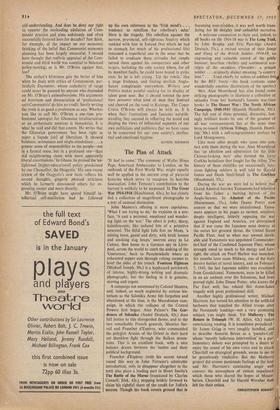The Plan of Attack
'IT had to come.' The comment of Walter Hines Page, American Ambassador to London, on the
outbreak of the First World War, might equally well be applied to the current crop of pictorial histories which strive to recapture its horrible fascination. John Terraine's contribution to the harvest is unlikely to be surpassed. In The Great War 1914-1918 (Hutchinson, 63s.), he has closely tied a collection of magnificent photographs to a text of unusual distinction.
John Masters's offering is more capricious. `What I am trying to do,' he explains in a pre- face, 'is cast a personal, emotional and wander- ing light on the war.' The effect is jerky, sharp, kaleidoscopic, like isolated bits of a primitive newsreel. The fitful light falls first on Mons, 'a mining town, gaunt and dirty, with brick houses and smoking slag heaps,' swerves away to Le Cateau, then home to a German spy in Liver- pool, across the world to catch the sinking of the `Gneisenau,' back to Passchendaele where an exhausted sapper cuts through rotting corpses to level the sides of his trench. Fourteen Eighteen (Michael Joseph, 30s.) is a haphazard patchwork of intense, highly-strung writing and dramatic photographs; but the feeling in it is genuine, moving and urgent.
A campaign not mentioned by Colonel Masters, and, indeed, as much neglected by serious his- torians as the Salonika Army felt forgotten and abandoned at the time, is the Macedonian cam- paign, in which the collapse of the Central Powers first began. Alan Palmer's The Gar- deners of Salonika (Andre Deutsch, 42s.) does full justice to this disregarded theme, and to the two remarkable French generals, Maurice Sar- rail and Franchet d'Esperey, who commanded the polyglot Armies of the Orient in their hard yet thankless fight through the Balkan moun- tains. This is an excellent book, with a nice balance drawn between the battles and their political background.
Franchet d'Esperey (with his accent turned round this way in John Terraine's admirable introduction, only to disappear altogether in the text) also plays a leading part in Henri Isselin's The Battle of the Marne (translated by Charles Connell; Elek, 42s.), stepping briskly forward to claim his rightful share of the credit for Joffre's success. Though the book covers ground that is becoming over-tiodden, it was well worth trans- lating for it§ insights 'and -coldiirful narrative.
A welcome companion to these and, indeed, to all books on the 1914-18 war is The Long Trail, by John Brophy and Eric Partridge (Andre Deutsch, 35s.), a revised version of their Songs and Slang of the British Soldier, 1914-18, an engrossing and valuable record of the griSly humour, heartless ribaldry and sentimental nos- talgia of the swaddies. ('Swsonv a primate soldier . . . originally dialect meaning "a country lout." . . . Used chiefly by sailors of,soldiers but. by the BEF freely'—the book contains some wonderfully emotive illustrations of the species.)
Mrs. Alan Moorehead has, also found some striking photographs to illustrate a collection of episodes from her husband's famous war-time books in The Desert War : The North African Campaign, 194Q-1943 (Hamish Hamilton, 50s'.). The full text of these personal, discursive, last- ingly brilliant books by' one of the greatest of all war correspondents has at the same time been re-issued (African. Trilogy, Hamish Hamil- fon, 30s.) with a self-congratulatory preface by Lord Montgomery.
Like most other people who came into conr tact with them during the war, Alan Moorehead has 'an affection and admiration for the little Chinese-looking men' who formed the, forty Gurkha battalions that fought for the Allies. The history of these childlike yet occasionally„fero- cious fighting soldiers is well told by Harold James and Denis Sheil-Small in The Gurkhas (Macdonald, 35s.).
During the war we were led to believe that Grand Admiral Isoroku Yamamoto had inherited from his father a burning hatred of the Anglo-Saxons. In Admiral of the Pacific (Heinemann, 35s.), John Deane Potter now assures us that we were misinformed. Yama- moto appears in his pages as earnest, sensitive, deeply intelligent, bitterly opposing the war against England and America, yet, determined that if war came the Japanese must destrOy at the outset her greatest threat, the United States Pacific Fleet. And so when war seemed inevit- able and Yamamoto was appointed Commander- in-Chief of the Combined Japanese Fleet, whose strength owed so much to his energy and fore- sight, the attack on Pearl Harbor was launched.
Six months later came Midway, one of the truly decsive battles of naval history, and on February 7, 1943, the last Japanese soldier was evacuated
. from Guadalcanal. Yamamoto, soon to be killed in an air ambush over the Solomons, had been proved right. John Deane Potter, who knows the e Far East well, has related this doom-laden tragedy with great professional skill.
Another highly professional writer, Michael Harrison, has turned his attention to the artificial harbours that supplied the Allied troops after the Normandy landings—not a very promising subject, you might think. Yet Mulberry : The Return in Triumph (W. H. Allen, 42s.) makes entertaining reading. It is sometimes prejudiced : Sir James Grigg is very roughly handled, and to describe Aneurin Bevan as a 'pseudo-Celt' whose 'meanly ludicrous intervention' in a par- liamentary debate was prompted by a desire to enjoy the sound of his own voice and to attack
Churchill on strategical grounds, seems to me to be gratuitously vindictive. But the Mulberry project did arouse passionate feelings at the time and Mr. Harrison's continuing anger well conveys the atmosphere of violent impatience which those who shared the hopes of Mount- batten, Churchill and Sir Harold Wernher then felt for their critics.
CHRISTOPHER HIBBERT






























 Previous page
Previous page